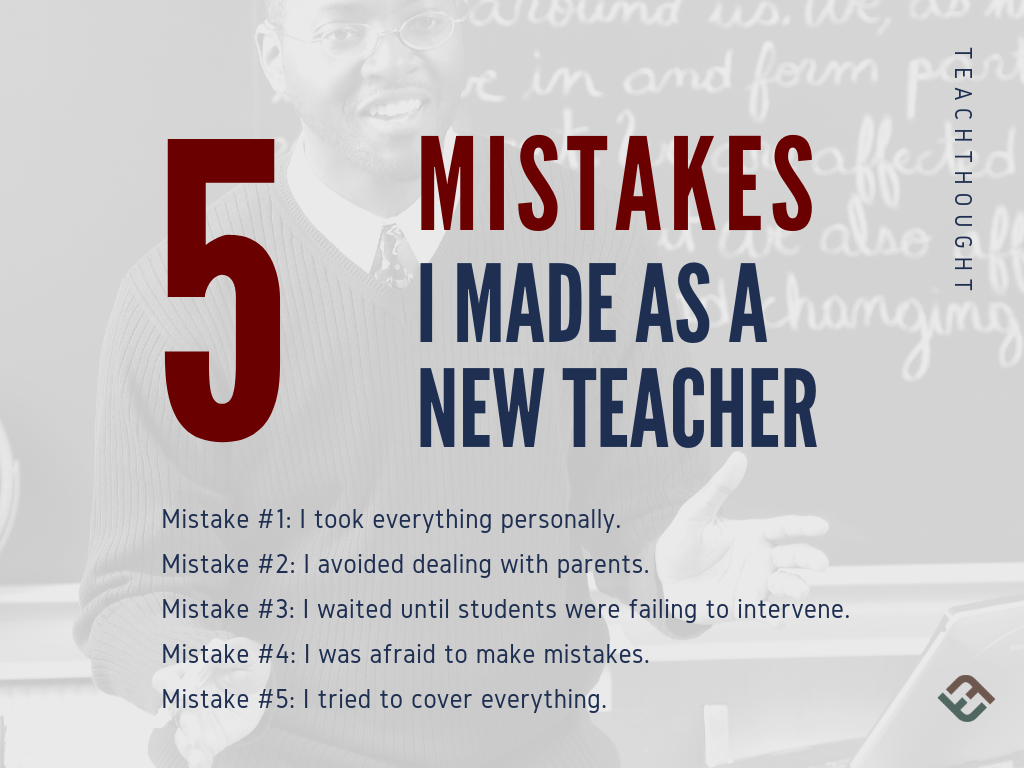
Here Are The 5 Mistakes I Made As A New Teacher
contributed by Robyn Jackson
I’ve been talking to teachers lately about creating an environment in their classrooms where students are free to make mistakes and supported in learning from their mistakes. I argue that learning from mistakes can be a powerful way of helping students learn. But the value in learning mistakes isn’t just limited to our students.
As professionals, we need to learn from our mistakes as well. I realize that the environment in our profession isn’t exactly friendly to making and learning from mistakes right now, but I would encourage you to not let that stop you. Don’t be afraid to make the inevitable mistake or two in the classroom as you teach. Instead, be open to learning from your mistakes and using them to make your teaching stronger.
See also 15 Mental Health Tips For Teachers
To get the ball rolling, I thought I’d share five mistakes I made early in my career and what I learned from them.
Mistake #1: I took everything personally.
If the students disobeyed me, I got angry at them. If they didn’t do their work, I took it as a personal affront. Every time they put their heads down or didn’t turn in their homework, I was personally offended. The problem with taking things personally is that it usually leads to blaming the students.
The moment I realized that it wasn’t about me, I was able to shift my focus from how offended I was to what I needed to do to help my students make better decisions the next time. When I stopped taking personal offense at everything my students did (or didn’t do) I was able to focus on how I could best respect, honor, appreciate, and capitalize on the currencies they brought to the classroom.
Mistake #2: I avoided dealing with parents.
When parents contacted me, I used to cringe. Usually, they were not calling with good news. I did everything I could to avoid dealing with them. By seeing them as an adversary, or at least a nuisance I wanted to avoid, I created more problems with parents than I solved.
Once I learned to see parents as my partners, to keep them informed about what was going on in my class, and to bring them into the loop early in the process, I found that parents were my best allies. As a result, even when we disagreed on a course of action for their child, we were more likely to work out a plan that we could both support.
Mistake #3: I waited until students were failing to intervene.
I was always surprised at interim time that certain students were failing. What made it even worse was that by the time I sent out interims, there was really little students could do to redeem their grades before the end of the marking period. It wasn’t until I created a proactive intervention plan that forced me to systematically look at student performance that I started to notice the moment students began to fail and plan in advance what I would do to get them back on track. Then, I could intervene before they got so far in the hole that they could not possibly ever get out.
Mistake #4: I was afraid to make mistakes.
I thought that as the teacher, I always had to be right. I worked really hard at being the smartest person in the room. When my students asked me a question for which I had no answer, I’d make one up. If I made a mistake, I would cover it up. Only when I gave myself permission to be, well, human, did my teaching get really good.
When I let my students see me make mistakes, admit them, and then take steps to correct them, it made it okay for them to make mistakes too. The more I took risks in the classroom, the more I made it safe for them to take risks. As a result, my classroom became a place where real learning could happen.
Mistake #5: I tried to cover everything.
I thought that if it was in the curriculum, it had to be taught. The problem is that most curriculum documents are so bloated that it is difficult to cover everything or allot the same amount of time to every assignment. What’s more, covering the curriculum does not guarantee that the students will meet all of the standards.
Once I realized that, I began to focus on the standards and on helping my students reach the standards rather than just cover the curriculum. Doing so gave me more time to teach what really mattered and more flexibility to adjust my teaching based on my students’ needs.
What mistakes have you made and what have you learned from them? What is some advice you would give to teachers starting out?
A version of this blog first appeared on ASCD EDge; Robyn Jackson is the founder of Mindsteps Inc. and the author of 10 books, including Never Work Harder Than Your Students and Other Principles of Great Teaching (ASCD, 2009), and her latest Real Engagement: How do I help my learners become motivated, confident, and self-directed learners? (ASCD, 2015), coauthored with Allison Zmuda; The Mistakes I Made as a New Teacher; adapted image attribution flicker user tulanepublicrelations
